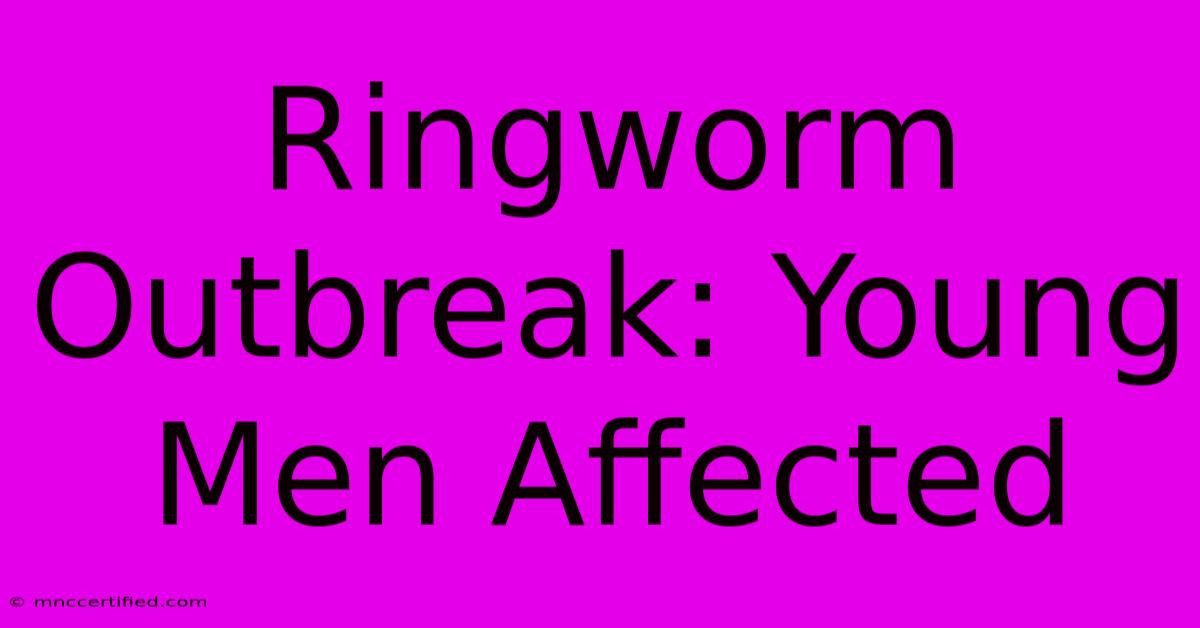Ringworm Outbreak: Young Men Affected

Table of Contents
Ringworm Outbreak: Young Men Disproportionately Affected
Ringworm, a common fungal infection, is experiencing a concerning surge in cases among young men. While not inherently dangerous, this outbreak highlights the importance of understanding its causes, symptoms, and effective treatment. This article will delve into the specifics of this recent trend, providing crucial information for prevention and management.
Understanding the Ringworm Outbreak
Recent epidemiological data suggests a disproportionate increase in ringworm infections among young adult males. While the exact reasons behind this trend are still under investigation, several contributing factors are being explored:
Potential Contributing Factors:
- Increased Close-Contact Activities: Participation in contact sports, shared living spaces (like college dorms or military barracks), and gym activities increases the risk of fungal transmission. The close proximity and shared equipment facilitate the spread of dermatophytes, the fungi responsible for ringworm.
- Hygiene Practices: Poor hygiene practices, including infrequent showering and a lack of proper skin cleansing, can create a favorable environment for fungal growth. This is particularly relevant in shared spaces where hygiene standards might be inconsistent.
- Weakened Immune Systems: While not always the primary cause, a weakened immune system can make young men more susceptible to ringworm infections. Stress, inadequate nutrition, and underlying health conditions can compromise immunity.
- Shared Grooming Items: Sharing razors, towels, and other personal grooming items is a significant risk factor. These items can easily harbor dermatophytes, leading to rapid transmission.
- Environmental Factors: Certain environmental conditions, such as high humidity and warmth, can promote fungal growth. This could be contributing to the outbreak in specific geographic locations or during particular seasons.
Recognizing the Symptoms of Ringworm
Early detection is crucial for effective treatment and preventing further spread. Ringworm typically manifests as a:
- Circular, red rash: Often itchy and scaly, the rash may appear on the scalp, body, groin (jock itch), beard (tinea barbae), or feet (athlete's foot).
- Raised, inflamed border: The outer edge of the rash is usually more inflamed than the center.
- Blistering or scaling: Depending on the location and severity, blisters or excessive scaling may be present.
Important Note: If you suspect you have ringworm, it's crucial to consult a dermatologist or healthcare professional for proper diagnosis and treatment. Self-treating can delay effective management and potentially worsen the infection.
Effective Treatment and Prevention Strategies
Treatment for ringworm typically involves antifungal medications, either topical creams, lotions, or oral medications depending on the severity and location of the infection. Your doctor will determine the most appropriate course of action based on your specific case.
To prevent ringworm, consider these essential strategies:
- Maintain good hygiene: Shower regularly and thoroughly cleanse your skin, especially after physical activity or sweating.
- Avoid sharing personal items: Don't share towels, razors, clothing, or other items that come into direct contact with your skin.
- Keep skin dry: Ensure your skin is thoroughly dry after showering, paying particular attention to areas prone to fungal growth.
- Practice safe sports: Where possible, avoid direct skin-to-skin contact during sports and use individual equipment.
- Boost your immune system: Maintain a healthy lifestyle with a balanced diet, regular exercise, and adequate sleep.
Conclusion: Addressing the Ringworm Outbreak
The recent increase in ringworm cases among young men underscores the need for increased awareness and proactive prevention strategies. By understanding the risk factors, recognizing the symptoms, and adhering to effective treatment and preventive measures, we can mitigate the spread of this common yet impactful fungal infection. Remember, early diagnosis and appropriate treatment are key to a swift recovery and the prevention of further transmission. Consult a healthcare professional if you suspect a ringworm infection.

Thank you for visiting our website wich cover about Ringworm Outbreak: Young Men Affected. We hope the information provided has been useful to you. Feel free to contact us if you have any questions or need further assistance. See you next time and dont miss to bookmark.
Featured Posts
-
Is Return To Paradise Right For Winter
Nov 23, 2024
-
Stream Psg Vs Toulouse Ligue 1 Football
Nov 23, 2024
-
Bayerns Victory Kanes Three Goals
Nov 23, 2024
-
What Is 650 Euros In Us Dollars
Nov 23, 2024
-
Bond Place Hotel Toronto Canada
Nov 23, 2024